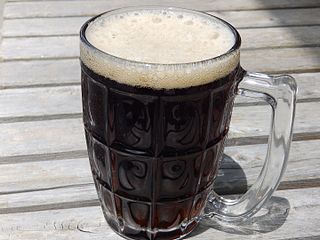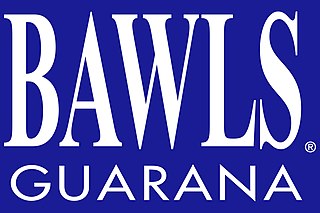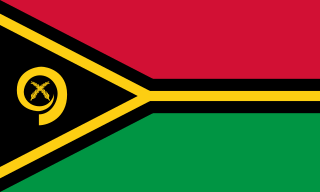Related Research Articles

A soft drink is a drink that usually contains water, a sweetener, and a natural and/or artificial flavoring. The sweetener may be a sugar, high-fructose corn syrup, fruit juice, a sugar substitute, or some combination of these. Soft drinks may also contain caffeine, colorings, preservatives, and/or other ingredients.

Kava or kava kava is a crop of the Pacific Islands. The name kava is from Tongan and Marquesan, meaning 'bitter'; other names for kava include ʻawa (Hawaiʻi), ʻava (Samoa), yaqona or yagona (Fiji), sakau (Pohnpei), seka (Kosrae), and malok or malogu. Kava is consumed for its sedating effects throughout the Pacific Ocean cultures of Polynesia, including Hawaii and Vanuatu, Melanesia, some parts of Micronesia, such as Pohnpei and Kosrae, and the Philippines.

Root beer is a sweet North American soft drink traditionally made using the root bark of the sassafras tree Sassafras albidum or the vine of Smilax ornata as the primary flavor. Root beer is typically but not exclusively non-alcoholic, caffeine-free, sweet, and carbonated. Like cola, it usually has a thick and foamy head. A well-known use is to add vanilla ice cream to make a root beer float.
Diet or light beverages are generally sugar-free, artificially sweetened beverages with few or no calories. They are marketed for diabetics and other people who want to reduce their sugar intake.
Jones Soda Co. is a beverage company based in Seattle, Washington, United States. It bottles and distributes soft drinks, non-carbonated beverages, energy drinks, and candy.

Bawls is a non-alcoholic, highly-caffeinated soft drink.

An ice cream float or ice cream soda, also known as a spider in Australia and New Zealand, is a chilled beverage that consists of ice cream in either a soft drink or a mixture of flavored syrup and carbonated water.
Kava cultures are the religious and cultural traditions of western Oceania which consume kava. There are similarities in the use of kava between the different cultures and islands, but each one also has its own traditions.

Monster Beverage Corporation is an American beverage company that manufactures energy drinks including Monster Energy, Relentless and Burn. The company was originally founded as Hansen's in 1935 in Southern California, originally selling juice products. The company renamed itself as Monster Beverage in 2012, and then sold their Hansen's juices and sodas and their other non-energy drink brands to The Coca-Cola Company in 2015.

Blue Sky Beverage Company was a beverage company that produced soft drinks and energy drinks. It is a wholly owned subsidiary of the Monster Beverage Corporation. The company was established in Santa Fe, New Mexico, in 1980, where it remained until it was purchased by Monster in 2000. Coca-Cola North America took ownership of Blue Sky Sodas, Hansen’s Juice Products, Hansen’s Natural Sodas, Hubert’s Lemonade, Peace Tea and other non-energy drink brands as part of Coke’s partnership with Monster Beverage Corp on Jun 12, 2015. Blue Sky Beverage Company now operates out of Corona, California. The southwestern look and feel of the artwork on the soda cans is reminiscent of the company's roots in New Mexico.

The cuisine of Vanuatu incorporates fish, root vegetables such as taro and yams, fruits, and vegetables. Most island families grow food in their gardens, and food shortages are rare. Papayas, pineapples, mangoes, plantains, and sweet potatoes are abundant through much of the year. Coconut milk and cream are used to flavor many dishes. Most food is cooked using hot stones or through boiling and steaming; little food is fried. Since Vanuatu is one of the few South Pacific regions influenced by the outside world, Vanuatu's food has a multicultural nature.

Forage and farm-based foods have long been combined in Fijian cuisine. Although rice, wheat, and tea have all been staples during the colonial era, the native Fijians still eat primarily tubers and coconuts in their diet. Native Americans have farmed higher calorie foods like cassava, taro, and yams for thousands of years. The cuisine of Fiji is renowned for its seafood and various green vegetables, including Ota, a young forest fern that is collected for consumption, and Bele, a plant that resembles spinach and is also known as slippery cabbage.
Lava Cola is a cola drink produced in Vanuatu by Vanuatu Beverage Ltd. It contains a kavalactone additive, kava consumption being traditionally important in western Pacific nations. Lava Cola has been described as an "anti-energy drink". Australian media have noted that it "produces the calming effect of kava without the muddy taste," adding that, while kava itself is an acquired taste, Lava Cola may well be suitable for export.

The ʻava ceremony is one of the most important customs of the Samoa Islands. It is a solemn ritual in which a ceremonial beverage is shared to mark important occasions in Samoan society. The Samoan word ʻava is a cognate of the Polynesian word kava associated with the kava cultures in Oceania. Both terms are understood in Samoa.

Zevia is a Los Angeles-based company that produces soft drinks, organic tea, energy drinks and mixers sweetened with stevia. All Zevia products are zero-calorie, sugar-free, gluten-free, vegan, certified kosher, and certified by The Non-GMO Project. In June 2021, Zevia filed to go public with an IPO.
A relaxation drink is a non-alcoholic beverage containing calming ingredients normally found in nature. It is a functional beverage that serves to calm a person but unlike other calming beverages such as tea, relaxation drinks almost universally contain more than one active ingredient. Relaxation drinks may be served chilled and carbonated. Others have now been introduced in shot-form.
References
- ↑ Hersch, Jerry (January 1, 2010). "No bull: chill-out drinks challenge buzzy brands". The Sydney Morning Herald . Retrieved July 16, 2010.
- ↑ Jerry Hirsch, Kava 'anti-energy' drink takes root in the Southland, Los Angeles Times , December 29, 2009